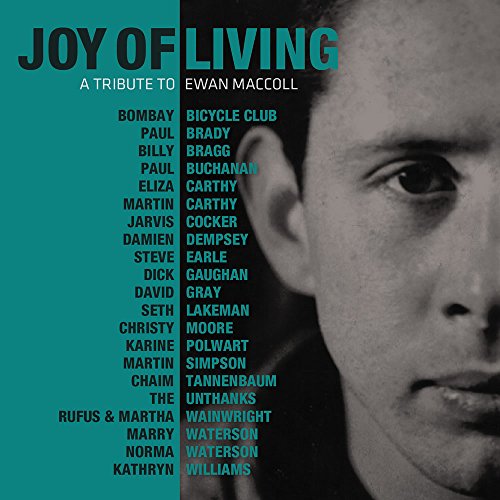
Various Artists
Joy of Living: A Tribute to Ewan Maccoll
Release Date: Oct 30, 2015
Genre(s): Folk, Pop/Rock, British Folk, Political Folk, Sea Shanties, Work Song
Record label: Compass
Music Critic Score
How the Music Critic Score works
Buy Joy of Living: A Tribute to Ewan Maccoll from Amazon
Album Review: Joy of Living: A Tribute to Ewan Maccoll by Various Artists
Excellent, Based on 6 Critics
Based on rating 5/5
That controversial pioneer of the British folk revival, the late Ewan MacColl, was born in 1915, and the centenary is being marked by reminders that he was a bravely original songwriter. On this remarkable double album, 21 artists rework his songs, ranging from poignant studies of working lives to political comment and love ballads. Many of the best are from the experimental Radio Ballads shows, broadcast by the BBC between 1957 and 1964; they include Norma Waterson’s gently pained version of Moving On Song, and Karine Polwart’s powerful The Terror Time, both dealing with the realities of Gypsy life.
Based on rating 8/10
One hundred years on from his birth, Ewan MacColl’s reputation is at something of an odd point. It’s true that a number of MacColl’s compositions remain staples on the folk scene and beyond (within just a couple of months this year I saw both Barb Jungr and Neill MacColl perform “Sweet Thames, Flow Softly” in separate shows at London’s Royal Festival Hall) justifying Christy Moore’s comment that MacColl’s work “has been absorbed into the mainstream national repertoire. ” Still, there’s a case to be made that MacColl’s achievements have been less acknowledged than they might have been in recent years.
Based on rating 8/10
Celebrating the centenary of his birth, Compass Records has compiled this glowing two-disc tribute to British folk icon Ewan MacColl. MacColl's influence on the British folk revival of the '50s and '60s is immeasurable and the range of artists who lined up to pay homage includes both newcomers and folk legends in their own right. Members of the Waterson and Carthy clans are well-represented here and are predictably well-suited to the material.
Based on rating 4/5
Ewan MacColl’s legacy as godfather of British folk remains compromised by his dogmatic, Marxist approach to the music (and finger-in-ear posturing), but this 21-track centenary tribute underscores what a fine songwriter he was. Produced by sons Calum and Neill, it embraces established interpreters of his canon (Dick Gaughan, Martin Carthy, Christy Moore) and adds less likely names such as David Gray and Rufus and Martha Wainwright (with a languid take on Sweet Thames Flow Softly). Honour is done to MacColl’s pungent political writing – oft-covered Dirty Old Town gets a gruff, bluegrass makeover from Steve Earle – but also to personal pieces such as My Old Man (sung straight by Chaim Tannenbaum) and the lullaby Cannily, Cannily, enchantingly delivered by the Unthanks.
Based on rating 4/5
Ewan MacColl polarised opinion in many spheres, but there’s one thing no one can deny: his ability to write a brilliant song. This is borne out on Joy Of Living, a 21-track tribute to MacColl’s musical legacy, compiled to mark the centenary of his birth. Performers come from a range of backgrounds that MacColl might not have approved wholeheartedly – the folk tradition is strongly represented by various members of the Carthy- Waterson dynasty, along with Seth Lakeman and others, but Jarvis Cocker and David Gray come from somewhat different areas of endeavour.
Based on rating 3/5
Various ArtistsJoy of Living: A Tribute to Ewan MacColl(Compass)Rating: 3.5 out of 5 stars Born James Miller (he changed it to the legendary MacColl later), Ewan MacColl was not just a noted British traditional folk songwriter; he was also a labor activist, playwright, poet, actor and record producer. At the time of his 1989 death at 74, his best known song in America (out of more than 300 he composed) was one he wrote but never sang. Roberta Flack’s version of “The First Time Ever I Saw Your Face” was written for his third wife Peggy Seeger, but it didn’t elevate his name in the States, a country from which he was banned due to his Communist viewpoints.
'Joy of Living: A Tribute to Ewan Maccoll'
is available now

